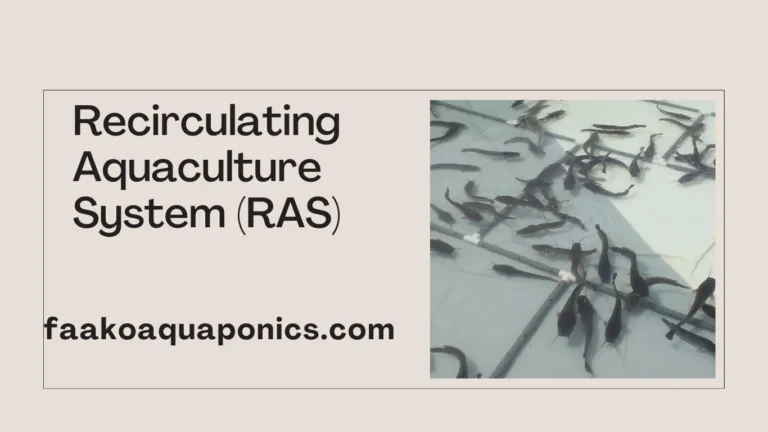Fish farm record keeping is not just a recommended practice; it’s an indispensable tool for success. Whether you’re a seasoned fish farmer or just a hobbyist in fish farming, understanding the importance of record-keeping cannot be overstated.
From tracking growth rates, mortality rates, and to monitoring water quality parameters. Every aspect of your fish farming operation can benefit from organized and thorough record-keeping practices.
Definition of Record Keeping
Record keeping refers to the systematic process of documenting, organizing, and maintaining information or data related to various activities, transactions, events, or observations within an organization or system.
It involves the creation, storage, retrieval, and management of records to facilitate decision-making, accountability, compliance, and historical documentation.
Meaning of Record Keeping in Fish Farming
In the context of fish farming, fish farm record keeping specifically pertains to the practice of documenting and managing data or information relevant to the operation and management of aquaculture or fish farming activities.
This includes recording various parameters, observations, and activities associated with fish cultivation. Water management, feeding practices, health monitoring, environmental conditions, regulatory compliance, mortality issues, and financial transactions.
Importance of Record Keeping in Fish Farming
fish farm record keeping serves as the backbone of effective management in fish farming. Here are some reasons why it matters:
1. Monitoring Growth and Performance
One of the primary reasons for maintaining fish farm records is to monitor the growth and performance of your fish stock. By meticulously recording data such as initial stocking date, stocking densities, quantity of feed, feed conversion ratios. With growth rates, you gain valuable insights into the health and productivity of your fish.
Regular measurements of length, weight, and other relevant metrics allow you to track the progress of individual fish. This as well as the overall performance of your stock. This information not only helps you identify potential issues early on. But also enables you to make informed decisions regarding feeding regimes, stocking densities, and harvest schedules.
2. Managing Feeding Practices
Efficient feeding practices are essential for optimizing growth and minimizing costs in fish farming. fish farm record keeping plays a crucial role in this aspect by allowing you to track feed consumption rates, adjust feeding schedules. And also evaluate the effectiveness of different feed formulations.
By maintaining detailed feeding records, you can identify trends in feed utilization, detect any deviations from expected consumption pattern. And also fine-tune your feeding strategies accordingly. This proactive approach not only promotes healthier and more robust fish. But also contributes to overall cost savings and operational efficiency.
When you are using the responsive method of feeding, do not assume the fish eat he same quantity every day. You have to always observe how many quantity they eat and record that down
Monitoring Water Quality
Water quality is paramount in aquaculture, as it directly impacts the health and well-being of your fish. Regular monitoring and recording of water quality parameters such as temperature, dissolved oxygen levels, pH, and ammonia. Nitrite concentrations are also essential for maintaining optimal growing conditions.
As I once made a mistake regarding the water quality in my fish farm, I lost over 400 fish. You can avoid that by constantly recording and keeping the quality of your water in the fish pond
Whether it involves adjusting aeration rates, implementing water treatments, or conducting partial water exchanges. Timely interventions based on comprehensive record keeping can help prevent potential disasters such as fish stress, disease outbreaks, and mortality events
Ensuring Regulatory Compliance
Compliance with regulatory requirements is another critical aspect of fish farming that necessitates diligent fish farm record-keeping. Depending on your location and the specific species you’re farming, various laws, regulations, and permits may govern aspects. Such aspects are water use, discharge, stocking densities, and medication usage.
Maintaining accurate records not only helps demonstrate compliance with these regulations. But also provides a valuable resource in the event of inspections, audits, or inquiries from regulatory agencies.
By having comprehensive documentation of your operational practices and adherence to regulatory standards, you can mitigate the risk of fines, penalties, or legal consequences that may arise from non-compliance.
Best Practices for Effective Record Keeping
Now that we have established the importance of record keeping in fish farming, let’s look at some best practices. These help you streamline your documentation processes and maximize their effectiveness
Use Digital Tools
In today’s digital age, leveraging technology can greatly enhance the efficiency and accuracy of record keeping in fish farming.
There are numerous software applications and mobile apps specifically designed for aquaculture management. They offer features such as data entry, automated calculations, trend analysis, and report generation.
Investing in user-friendly aquaculture management software can simplify the task of record keeping. It also centralize your data in a secure digital platform, and provide valuable insights to inform decision-making.
Whether you prefer cloud-based solutions for real-time access or offline applications for remote farming locations. You have to choose a tool that aligns with your operational needs and preferences.
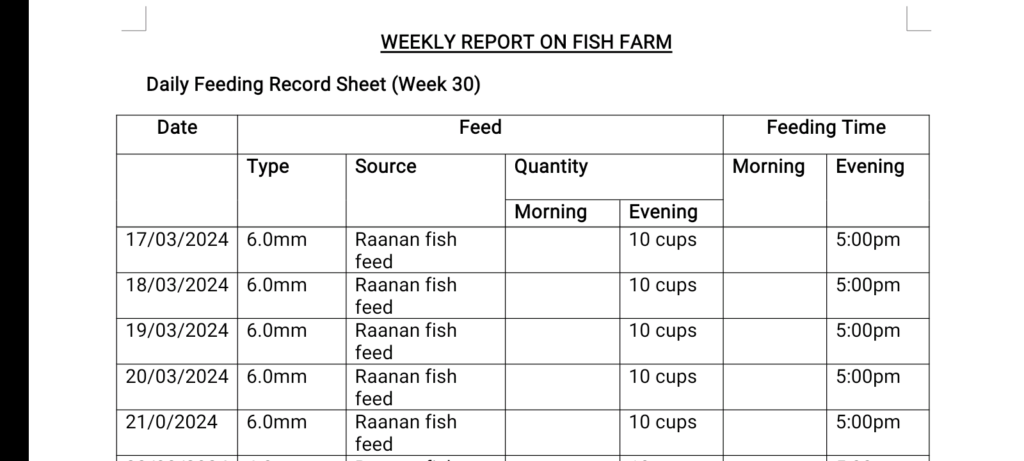
the fish were over 6 months which means they were now eating once a day that is why the mornings are blank
Standardize Data Collection Protocols
Consistency is key when it comes to record keeping in fish farming. Establishing standardized protocols for data collection ensures uniformity across different aspects of your operation. You ought to make it easier to compare and analyze information over time.
Clearly define the parameters to be recorded, the units of measurement, the frequency of data collection, and the responsible personnel for each task.
Providing training and guidance to your staff on proper data collection techniques and protocols can help minimize errors and discrepancies. This will also ensure the reliability and accuracy of your records.
Regularly Review and Analyze Data
Recording data is just the first step. The real value lies in analyzing and interpreting that data to extract actionable insights. Set aside dedicated time intervals to review your records, identify trends, and assess the performance of your fish farming operation.
Look for patterns, correlations, or anomalies in the data that may indicate areas for improvement or potential problems. Are there seasonal fluctuations in water temperature that affect fish growth rates? Is there a sudden spike in feed consumption that warrants further investigation?
By proactively monitoring and analyzing your records, you can identify opportunities to optimize performance. Also mitigate risks, and make informed decisions to drive continuous improvement.
Maintain Secure Backup Copies
In the digital age, data loss can pose a significant threat to your fish farming operation. Whether it’s due to technical failures, cyber threats, or human error, the consequences of losing critical records can be severe.
Ensure that you maintain secure backup copies of your data to safeguard against unforeseen circumstances. Whether through cloud storage solutions, external hard drives, or physical backups, regularly back up your records to multiple locations to minimize the risk of data loss. Implement robust security measures to protect sensitive information and restrict access to authorized personnel only.
Stay Organized and Audit-Ready
Organization is built on effective record keeping. Keep your records well-organized, labeled, and easily accessible to facilitate efficient retrieval and reference when needed.
Maintain a comprehensive logbook or electronic database that documents all relevant aspects of your aquaculture operation. These include stocking records, feeding logs, water quality data, medication usage, mortality records, and regulatory compliance documentation.
Implement a system for tracking revisions, updates, and annotations to ensure the integrity and traceability of your records over time.
By staying organized and audit-ready, you can confidently demonstrate transparency, accountability, and diligence in your record keeping practices, fostering trust among stakeholders and regulatory authorities alike.
Methods of Record Keeping in Fish Farming
There are several methods of fish farm record keeping, ranging from traditional pen-and-paper logbooks to sophisticated digital management systems.
The choice of method often depends on factors such as the scale of the operation, available resources, technological capabilities, and personal preferences. Here are some common methods of record keeping in fish farming:
1. Pen and Paper Logbooks
- Traditional pen and paper logbooks are a simple and cost-effective method of record keeping in fish farming.
- Fish farmers can manually record data such as stocking densities, feeding schedules, water quality parameters, mortality events, and other relevant information in designated logbooks or notebooks.
- While this method may lack the advanced features and automation of digital systems, it can still be effective for small-scale operations or farms with limited technological infrastructure.
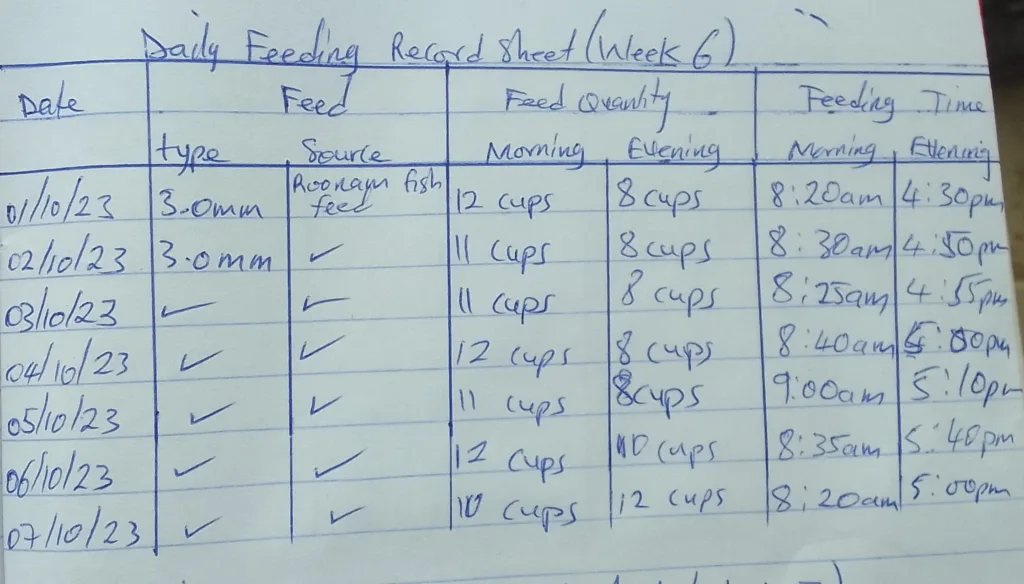
2. Spreadsheet Software
- Spreadsheet software such as Microsoft Excel or Google Sheets provides a versatile platform for organizing and analyzing data in fish farming.
- Fish farmers can create customized templates for recording various parameters, such as fish growth rates, feed consumption, water quality measurements, and expenses.
- Spreadsheets offer features such as formula calculations, data visualization tools, and the ability to generate reports and charts for easy analysis and decision-making.
- While spreadsheets offer more flexibility and functionality than pen-and-paper methods, they still require manual data entry and may be prone to errors if not properly maintained.
- It works online which means it needs an internet connection and may not function well in the absence of an internet
3. Aquaculture Management Software
- Aquaculture management software is specifically designed to streamline record keeping and management tasks in fish farming operations.
- These software solutions offer a wide range of features, including data entry forms, automated calculations, real-time monitoring, inventory management, and reporting capabilities.
- Fish farmers can use aquaculture management software to record and track various aspects of their operation, such as stocking information, feeding regimes, water quality parameters, mortality records, medication usage, and regulatory compliance documentation.
- By centralizing data in a secure digital platform, aquaculture management software helps improve efficiency, accuracy, and decision-making processes.
- Some software solutions also offer mobile applications that allow farmers to input data remotely from the field or farm site, enhancing accessibility and convenience.
4. Electronic Data Loggers
- Electronic data loggers are portable devices equipped with sensors that can automatically collect and record data on various parameters such as temperature, dissolved oxygen levels, pH levels, and conductivity.
- Fish farmers can deploy electronic data loggers in key locations within their aquaculture facilities to monitor water quality conditions continuously.
- These devices offer the advantage of real-time data collection and logging, reducing the need for manual intervention and ensuring accurate and timely recording of critical parameters.
- Electronic data loggers can be integrated with aquaculture management software or other data management systems for comprehensive analysis and reporting.
5. Paperless Systems
- Paperless record-keeping systems leverage digital technologies to eliminate the need for physical paper-based documentation.
- Fish farmers can use tablets, smartphones, computers, or ruggedized handheld devices equipped with specialized apps or software to input, store, and manage data electronically.
- Paperless systems offer benefits such as reduced paperwork, improved data accuracy, enhanced data security, and easier data sharing and collaboration.
- These systems can be particularly advantageous for field operations, remote farming sites, or environments where traditional paper-based methods may be impractical or inefficient.
- The advantage is that most paperless software of applications, or devices work with internet connectivity and may be difficult to work with at places without internet connection
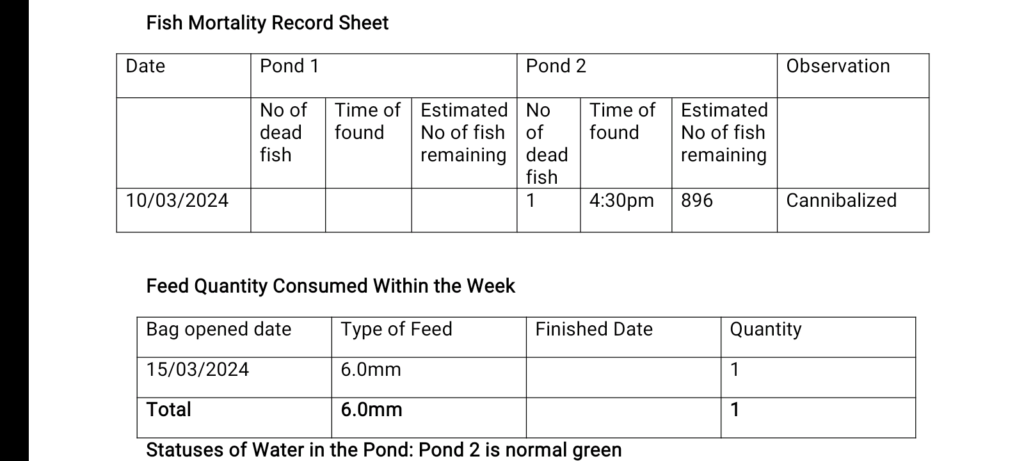
Areas Requiring Record Keeping in Fish Farming
Various areas necessitate meticulous fish farm record-keeping to ensure optimal management, compliance with regulations, and informed decision-making. Some key areas where records must be maintained include
1. Stocking and Inventory Management
- Recording data related to stocking densities, species composition, batch numbers, and source of seed stock is essential for tracking inventory and managing stock levels in fish farming operations.
- Keeping accurate records of stock movements, transfers, and sales enables fish farmers to maintain inventory integrity, track production levels, and fulfill regulatory requirements.
2. Feeding and Nutrition
- Recording data on feed types, quantities, feeding time, frequencies, and formulations is crucial for managing feeding practices and optimizing nutrition in fish farming.
- Monitoring feed conversion ratios, feed utilization efficiency, and feeding costs helps assess the effectiveness of feeding regimes and identify opportunities for improvement.
- Keeping feeding logs also facilitates traceability and quality control in the production process.
3. Water Quality Monitoring
- Maintaining records of water quality parameters such as temperature, dissolved oxygen levels, pH level, ammonia, nitrite, and nitrate concentrations is fundamental for ensuring optimal growing conditions and fish health.
- You have to always record when you change the water in the fish pond to keep track of the water change times.
- Regular monitoring and recording of water quality data help detect fluctuations, trends, or deviations from acceptable ranges, allowing for timely corrective actions and preventive measures. This will help prevent fish mortaliy associated with poor water quality.
4. Health and Disease Management
- Recording data on fish health observations, disease outbreaks, treatments administered, and medication usage is critical for monitoring and managing health issues in fish farming.
- Keeping accurate health records enables early detection of potential health problems, facilitates traceability of treatments, and supports compliance with veterinary regulations and medication withdrawal periods.
5. Mortality and Losses
- Documenting mortality events, causes of death, and associated factors such as stocking densities, environmental conditions, and management practices is essential for assessing and mitigating losses in fish farming.
- Analyzing mortality records helps identify underlying issues, implement preventive measures, and optimize stocking strategies to minimize losses and improve overall productivity.
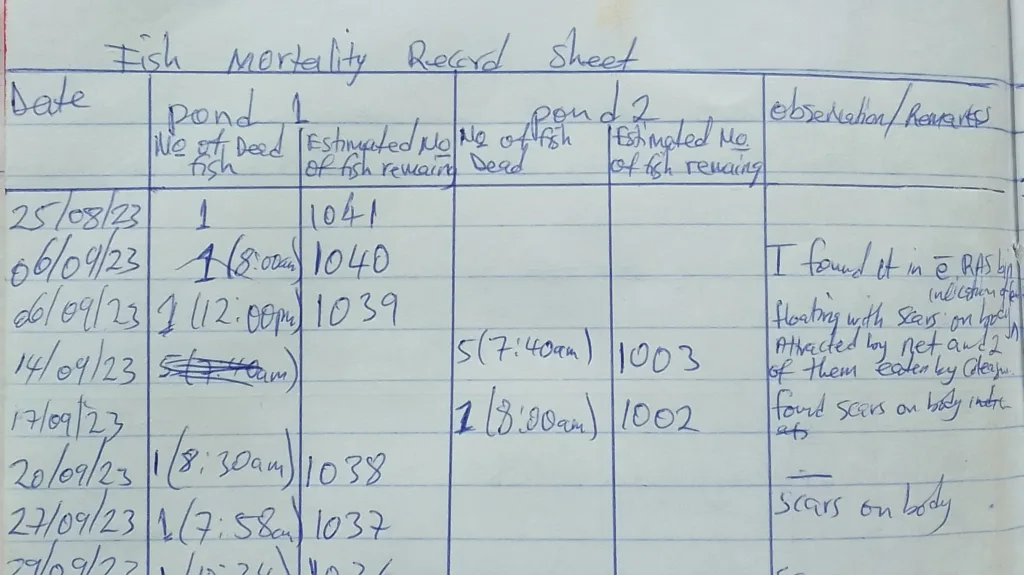
6. Regulatory Compliance
- You need to maintain records as a fish farmer to demonstrate compliance with regulatory requirements, permits, licenses, and certifications is a legal obligation for fish farming operations.
- You have to always keep accurate and up-to-date records of activities such as water use, discharge, stocking densities, medication usage, and environmental monitoring helps ensure adherence to applicable laws and regulations
7. Financial Management
- Recording financial transactions, expenses, revenues, and cost allocations is essential for managing budgets, tracking profitability, and conducting financial analysis in fish farming.
- Alway keep detailed financial records enables you to monitor costs, assess performance, make informed investment decisions, and prepare accurate financial reports for stakeholders and regulatory authorities
Challenges of Record Keeping in Fish Farming
While fish farm record keeping offers numerous benefits, there are also some potential disadvantages or challenges associated with this practice.
It’s essential to be aware of these drawbacks to effectively mitigate them and ensure that record keeping remains a valuable tool for managing aquaculture operations.
Here are some challenges and disadvantages of keeping records in a fish farm
1. Time and Labor Intensive
- Maintaining comprehensive records can be time-consuming and labor-intensive, requiring dedicated effort from farm personnel.
- Data entry, analysis, and documentation tasks may detract from other essential farm activities, leading to increased workload and potential strain on resources.
2. Technical Complexity
- Implementing and managing record-keeping systems, especially digital or software-based solutions, may require technical expertise and training.
- Fish farmers may encounter challenges related to system setup, data integration, troubleshooting, and software updates, particularly if they lack sufficient technological skills or support.
3. Cost of Implementation
- Adopting advanced record-keeping methods such as aquaculture management software or electronic data loggers may incur initial investment costs.
- Expenses may include purchasing software licenses, hardware devices, training programs, and ongoing maintenance or subscription fees, which could pose financial barriers for some fish farms, particularly small-scale operations.
4. Data Security and Privacy Concerns
- Storing sensitive information electronically or in paperless systems may raise concerns about data security and privacy.
- Fish farmers must implement robust security measures to protect records from unauthorized access, data breaches. Cyberattacks, or loss due to technical failures. These may require additional investments in cybersecurity infrastructure and protocols
5. Potential for Errors and Inaccuracies
- Despite efforts to maintain accuracy, record-keeping processes are susceptible to human errors, transcription mistakes, or data entry inaccuracies.
- Incomplete or inconsistent data collection, misinterpretation of information, and data manipulation errors. All these could compromise the reliability and integrity of records, leading to erroneous analysis, decision-making, or regulatory compliance.
6. Compliance Burden
- Regulatory requirements for record keeping in fish farming may impose additional administrative burdens and compliance obligations on farm operators.
- Ensuring adherence to regulatory standards, documentation of activities, and record retention policies. All necessitate extra time, effort, and resources, particularly if regulatory frameworks are complex or subject to frequent changes.
7. Risk of Overemphasis on Documentation
- Focusing excessively on record keeping may divert attention away from practical aspects of fish farming, such as hands-on management, observation, and intuition.
- Relying solely on data-driven decision-making without considering contextual factors or experiential knowledge, may overlook different opinions that could impact farm performance or outcomes.
8. Accessibility and Connectivity Challenges
- Accessing and managing records in remote or off-grid farming locations with limited connectivity or infrastructure may pose logistical challenges.
- Dependence on digital record-keeping systems may hinder operations in areas with unreliable internet access. Power outages, or technological constraints, necessitating alternative solutions or backup strategies.
9. Resistance to Change
- Introducing new record-keeping methods or technologies may face resistance from farm personnel who are accustomed to traditional practices or reluctant to embrace change.
- Overcoming resistance to adopting new systems, workflows, or protocols may require effective communication, training, and stakeholder engagement to foster acceptance and adoption.
Conclusion
Despite these potential disadvantages, the benefits of record keeping in fish farming generally outweigh the challenges. By addressing these drawbacks proactively and implementing strategies to mitigate risks, fish farmers can optimize their record-keeping practices to enhance productivity, profitability, and sustainability in aquaculture operations.
By adopting best practices such as leveraging digital tools, standardizing data collection protocols, regularly reviewing and analyzing data, maintaining secure backup copies, and staying organized and audit-ready, you can harness the power of record keeping to optimize your fish farming operation and navigate the complexities of aquaculture with confidence and competence.
Remember, the key to mastering record keeping lies not just in the act of recording data but in the insights and actions derived from that data to drive continuous improvement and innovation in your quest for aquaculture excellence.





